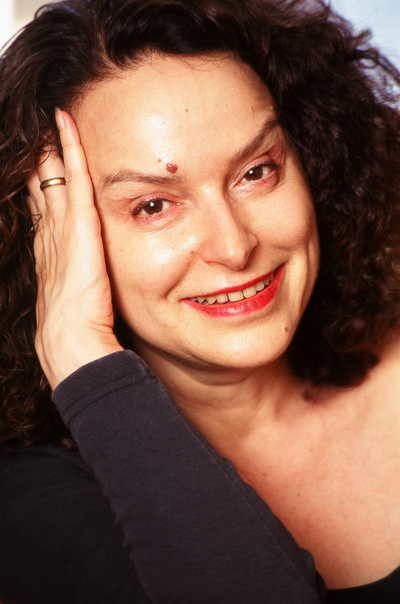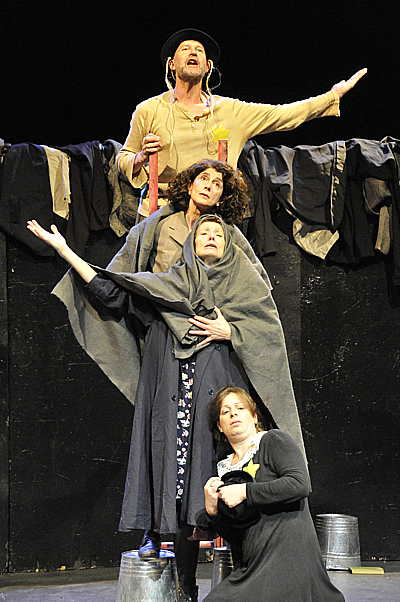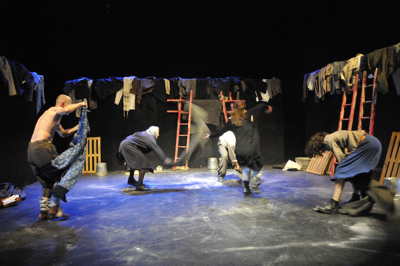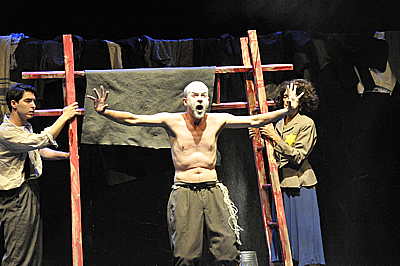DETERMINED WOMEN OF THE 21st CENTURY

AN INTERVIEW WITH JULIA PASCAL
PLAYWRIGHT / THEATRE DIRECTOR
by Coni Ciongoli Koepfinger / ICWP Board
Copyright 2014
 On behalf of ICWP, I recently spoke with one of the most brilliant writers of our world today, Julia Pascal. In addition, she is one of the most charming, poetic voices of the theatre and has had quite an interesting career path. As a fellow playwright, I was most interested in her process and understanding the way she interprets the world. When I first read her work, I knew that her unique vision was at the root of this brilliance, and after speaking to her for this interview, I caught a glimpse of the world through her eyes.
On behalf of ICWP, I recently spoke with one of the most brilliant writers of our world today, Julia Pascal. In addition, she is one of the most charming, poetic voices of the theatre and has had quite an interesting career path. As a fellow playwright, I was most interested in her process and understanding the way she interprets the world. When I first read her work, I knew that her unique vision was at the root of this brilliance, and after speaking to her for this interview, I caught a glimpse of the world through her eyes.
Julia Pascal is the foremost British Jewish playwright of her generation. Her texts are published by Oberon Books and Faber and have been staged in London, France, Belgium, Switzerland, Sweden, Germany and the US. She was the first woman to direct at the National Theatre in London. Pascal has written on Jewish culture, dance, theatre, France and Germany for The Jewish Chronicle,
The Jewish Quarterly, The Times, The Guardian, The Observer, City Limits, The Independent, and New Statesman. She has spoken about Israel on BBC Television and has twice been a judge for The Jewish Quarterly Book Prize. Her childhood memoirs are published in Memoirs of a Jewish Childhood (Boxtree{USA}). Her stage appearances were at The Royal Court Theatre, the Royal Shakespeare Company and The National Theatre. Her two major Jewish Archives were produced for Pascal Theatre Company where she is Artistic Director.
ABOUT JULIA PASCAL : UPCLOSE AND PERSONAL
ICWP : Why did you choose to create a path in the theatre?
JULIA PASCAL: I was a child who studied ballet and my love of theatre started with this work. It then moved to text and to acting. I was an actor for four years from age 20-24; then became a director at 27; and then wrote my first play at age 34.
ICWP: What are the most significant events in your childhood that helped to develop your imagination?
JULIA PASCAL: Ballet, films, foreign films… Specifically, my  grandparents brought me into the world of Eastern European Culture. They were from Romania and spoke nine languages; they took me to the ballet, and to concert halls to hear classical music, and to films like The Blue Angel-- This seemed to counter balance the working class culture of Manchester and Blackpool, the Northern English towns where I grew up.
grandparents brought me into the world of Eastern European Culture. They were from Romania and spoke nine languages; they took me to the ballet, and to concert halls to hear classical music, and to films like The Blue Angel-- This seemed to counter balance the working class culture of Manchester and Blackpool, the Northern English towns where I grew up.
Otherwise, I could have become quite alienated and insecure with only my parental influence. My father, an Irish Jew, wanted to be a Jewish cantor but his mother said that was not a good job for a nice Jewish boy! She forced him to become a doctor. This medical world gave me a sense of the body and broke any taboo about discussing the way it functions.
He was brought up orthodox but lost his faith after learning about the Holocaust. He then became a much more secular Jew and his love was mainly for the Hebrew language and for Israel. My mother was a professional invalid. She was a frustrated person who decided to live an unhappy life. She hated women and therefore this has made me encourage others and write women's roles as a way of defying this victim mentality. Yes, I believe it was my Romanian grandparents who gave me a larger world vision even if this was by their presence rather than anything they said. Though my grandmother did tell me, 'education is never to heavy to carry around'. I have never forgotten her words.
ICWP: When did you first realize that you were passionately involved with a life in the theatre / when did you first realize you could write plays?
JULIA PASCAL: I worked as a freelance journalist interviewing many survivors. I understood that I could write plays that were sourced by living testimony and that I had an ear for it. Perhaps this was also because of the childhood bonding with my foreign grandparents. I did not train as a journalist but, as I am rather obsessed by listening to personal history, and am a skilled listener, I decided to translate what I heard for the page. I then developed the interview skills as research as material for stage drama. Perhaps it is the sense of music in language; I heard so many as a small child; that also helps me here.
 I am somewhat like a human sponge. After dancing, performing, directing and writing I became aware of how to use parts of this early learning as a way of writing plays.
I am somewhat like a human sponge. After dancing, performing, directing and writing I became aware of how to use parts of this early learning as a way of writing plays.
I believe that the synthesis of all these elements, plus a knowledge of the human psyche, is vital for me.
My dance experience made me write in an experimental way at first, that is, playing with language / using multiple languages, incorporating the use of movement / dance / cabaret / comedic absurdity. Now I also challenge myself to write more naturalistic and realistic works.
ICWP : What is your mission in the theatre and why?
JULIA PASCAL: To write the plays I want to see, like Woman on the Bridge… To capture stories about lost women which explore taboo areas such as female sexuality and personal & universal identity.
ICWP: Could you call yourself a political playwright?
JULIA PASCAL: Yes I am fascinated by politics on all levels. I write political plays. My influences are Brecht, Dorothy Parker. Martha Gellhorn, Kantor, Grotowski.
ABOUT THE PROCESS OF COLLABORATION
ICWP: What do you feel, if any, are the main differences between an actor? a director? and a playwright?
JULIA PASCAL: I realize that actors and playwrights are similar, as they need to access the child within. Both are vulnerable processes whereas the director needs to have a far more intellectual AND instinctive energy. The director also needs to be aware of how to handle the psyches in the room. She has multiple roles. She must see the minute details and also be aware of the big picture at the same time.
The writer must too. The actor need only think of their own role and how to interact with the ensemble. But an instinctive actor, who has intelligence too, can contribute massively and the director must be humble and open to good ideas that come from others in the team.
ICWP: How do you see the relationships between them in order to procure the playwright’s vision?
JULIA PASCAL: A writer must choose a director who is a contributor and on the same wavelength otherwise it won’t work.
ICWP: Who are some of your favorite authors, who are the artists that inspire you?
JULIA PASCAL: Playwrights I love are Brecht, some of Howard Brenton, early Pinter. Virginia Woolf and Gellhorn have influenced me a lot though they are not stage writers. Also Charlotte Bronte. Phyllida Lloyd is a fine director that I admire. Joan Littlewood. The Coen Brothers have done dangerous work that pleases me. Ernst Lubtisch's To Be Or Not To Be. As for actors, Chaplin was a strong influence too. I enjoyed Laurence Olivier and saw him live when I was a teenager.
ABOUT THEATRE & THE ACADEMY
ICWP: Tell us about your academic life, how did it begin?
 JULIA PASCAL: When I was younger, I went to E15 Acting School, which was run by those who had worked with Joan Littlewood. I began my formal studies at London University for my Bachelors in English Literature and Language.
JULIA PASCAL: When I was younger, I went to E15 Acting School, which was run by those who had worked with Joan Littlewood. I began my formal studies at London University for my Bachelors in English Literature and Language.
I have a Masters in Philosophy and I am now doing a PhD at the University of York. Theatre by Creative Practice. This means writing three new plays and a 20,000 word thesis on my practice.
In closing, I asked Julia to help me compose an extemporaneous quote that would offer advice as well as inspire our ICWP readers. She generously pondered and composed these words that are not only practical and poetic but are brilliantly deep just like the artist herself.
“IN ORDER TO GROW AS AN ARTIST, YOU NEED HUMILITY AND THE ABILITY TO CONSTRUCT AND DECONSTRUCT YOUR OWN WORK AND TO CONTINUALLY RESEARCH AND INVESTIGATE AS PART OF THE ENDLESS JOURNEY WE CALL EDUCATION IN THE ARTS.” (Julia Pascal 2014)